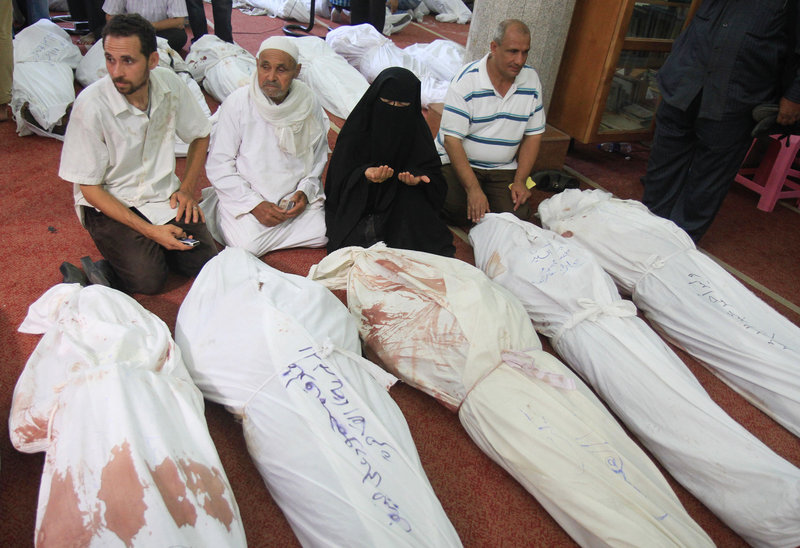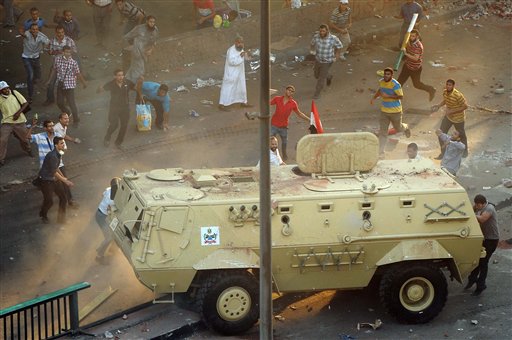CAIRO — Thousands of Muslim Brotherhood supporters have taken to the streets in several Cairo neighborhoods and elsewhere in Egypt in defiance of the military-imposed state of emergency.
The protesters poured out of the mosques after Friday prayers, responding to the group’s call for a “Day of Rage” following the deaths of 638 people Wednesday when riot police backed by armored vehicles, snipers and bulldozers smashed the two sit-ins in Cairo where ousted President Mohammed Morsi’s supporters had been camped out for six weeks to demand his reinstatement.
The government has authorized the use of deadly force against protesters targeting police and state institutions while the international community has urged both sides in Egypt to show restraint and end the turmoil engulfing the nation.
Nearly 4,000 people were wounded in Wednesday’s violence. It was the deadliest day by far since the 2011 popular uprising that overthrew autocratic ruler Hosni Mubarak and plunged the country into more than two years of instability.
The Health Ministry said that 288 of those killed were in the largest protest camp in Cairo’s Nasr City district, while 90 others were slain in a smaller encampment in Giza, near Cairo University. Others died in clashes that broke out between Morsi’s supporters and security forces or anti-Morsi protesters elsewhere in the Egyptian capital and other cities.
Violence spread on Thursday, with government buildings set afire, policemen gunned down and scores of Christian churches attacked. An angry crowd stormed the governor’s office in Giza, the city next to Cairo that is home to the pyramids. State TV blamed Morsi’s supporters for the arson and broadcast footage showing firefighters evacuating employees from the larger building of Giza’s government offices.
As turmoil spread, the Interior Ministry authorized the use of deadly force against protesters targeting police and state institutions. Egypt’s military-backed government also pledged to confront “terrorist actions and sabotage” allegedly carried out by Muslim Brotherhood members.
The Brotherhood, trying to regroup after the assault on its encampments and the arrest of many of its leaders, called for a mass rally Friday in a challenge to the government’s declaration of a monthlong state of emergency and a dusk-to-dawn curfew.
Also Thursday, the U.N. Security Council urged both the Egyptian government and the Muslim Brotherhood to exercise “maximum restraint” and work toward national reconciliation.
In Cairo, weeping relatives filled the mosque-turned-morgue near the gutted pro-Morsi protest camp in Nasr City, spilled into the courtyard and the streets. Inside, the names of the dead were scribbled on white sheets covering the bodies, some of them charred, and a list with 265 names was plastered on the wall. Heat made the stench from the corpses almost unbearable as the ice brought in to chill the bodies melted and household fans offered little relief.
Many people complained that authorities were preventing them from obtaining permits to bury their dead, although the Muslim Brotherhood announced that several funerals had been held Thursday.
A woman cradled the head of a slain man in her lap, fanning it with a paper fan. Nearby, an anguished man shouted, “God take revenge on you el-Sissi!” a reference to the powerful military chief, Gen. Abdel-Fatah el-Sissi.
Slumped over the body of his brother, Ihab el-Sayyed said the 24-year-old was getting ready for his wedding next week. “Last time I heard his voice was an hour or two before I heard of his death,” he said, choking back tears.
Elsewhere on Thursday, a mass funeral was held in Cairo for some of the 43 security troops authorities said were killed in Wednesday’s clashes. Interior Minister Mohammed Ibrahim, who is in charge of the police, led the mourners. A police band played solemn music as fire engines bore the coffins draped in white, red and black Egyptian flags in a funeral procession.
Wednesday’s deadly crackdown drew widespread condemnation from the Muslim world and the West.
President Barack Obama canceled joint U.S.-Egypt military exercises scheduled for next month, although he gave no indication that the U.S. planned to cut off its $1.3 billion in annual military aid to the country. The U.S. administration has avoided declaring Morsi’s ouster a coup, which would force it to suspend the military aid.
“While we want to sustain our relationship with Egypt, our traditional cooperation cannot continue as usual when civilians are being killed in the streets and rights are being rolled back,” Obama said, speaking from his weeklong vacation in Massachusetts.
Egypt’s interim government issued a late night statement saying the country is facing “terrorist actions targeting government and vital institutions” by “violent militant groups.” The statement expressed “sadness” for the killings of Egyptians and pledged to work on restoring law and order.
The statement also warned that Obama’s position “while it’s not based on facts can empower the violent militant groups and encourage them in its anti-stability discourse.”
The biennial Bright Star maneuvers, long a centerpiece of the deep ties between the U.S. and Egyptian militaries, have not been held since 2009, as Egypt grappled with the fallout from the revolution that ousted Mubarak. Morsi, a member of the Brotherhood, was elected president in 2012 during Egypt’s first democratic elections.
Attackers also set fire to churches and police stations across the country for a second day Thursday.
In the country’s second-largest city of Alexandria, Islamist protesters exchanged gunfire with an anti-Morsi rally, leaving scores injured, witnesses and security officials said. Attempts to storm police stations in the southern city of Assiut and northern Sinai city of el-Arish left at least six policemen dead and others injured.
Ishaq Ibrahim of the Egyptian Initiative for Personal Rights said his group had documented at least 39 cases of violence against churches, monasteries, Coptic schools and shops in different parts of the country on Wednesday.
Fearful of more violence Friday, some main streets were closed and people in many neighborhoods set up cement blocks and metal barricades. Residents checked IDs in scenes reminiscent of the 2011 revolution when vigilante-style groups set up neighborhood watches to prevent looting and other attacks.
The turmoil is the latest chapter in a bitter standoff between Morsi’s supporters and the interim leadership that took over the Arab world’s most populous country following a July 3 coup. The military ouster came after millions of Egyptians took to the streets to demand Morsi step down, accusing him of giving the Brotherhood undue influence and failing to implement vital reforms or bolster the ailing economy.
Morsi has been held at an undisclosed location ever since. Other Brotherhood leaders, including several arrested Wednesday, have been charged with inciting violence or conspiring in the killing of protesters.
The Brotherhood has spent most of its 85 years as an outlawed group or enduring crackdowns by successive governments. The latest developments could prompt the authorities to once again declare it an illegal group and force it to go underground.
Send questions/comments to the editors.





Success. Please wait for the page to reload. If the page does not reload within 5 seconds, please refresh the page.
Enter your email and password to access comments.
Hi, to comment on stories you must . This profile is in addition to your subscription and website login.
Already have a commenting profile? .
Invalid username/password.
Please check your email to confirm and complete your registration.
Only subscribers are eligible to post comments. Please subscribe or login first for digital access. Here’s why.
Use the form below to reset your password. When you've submitted your account email, we will send an email with a reset code.